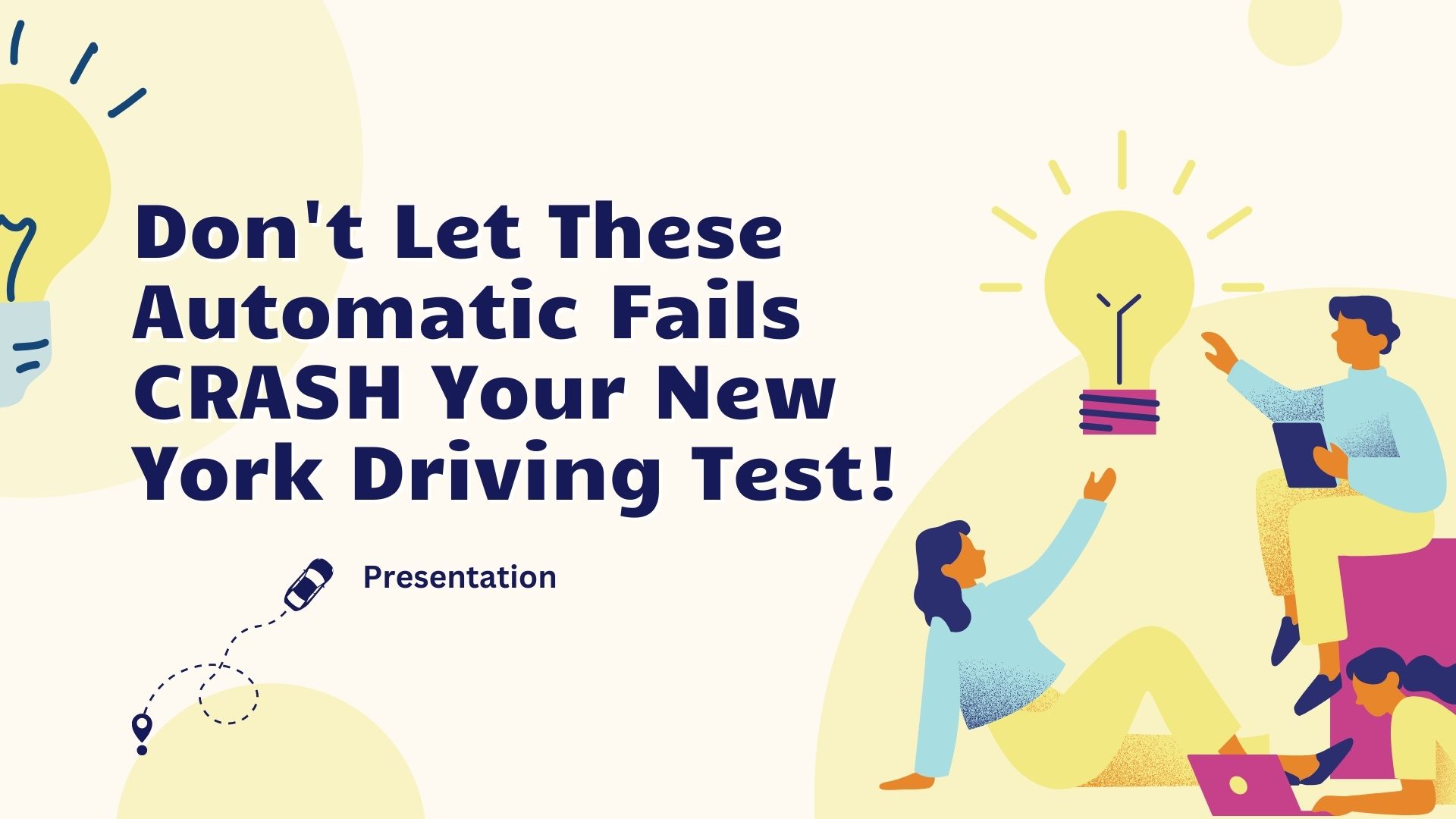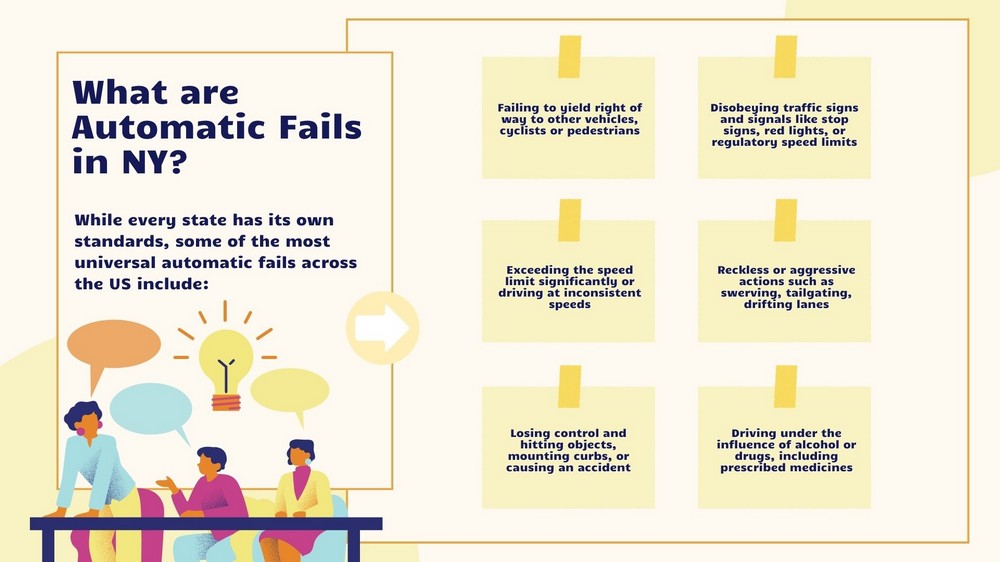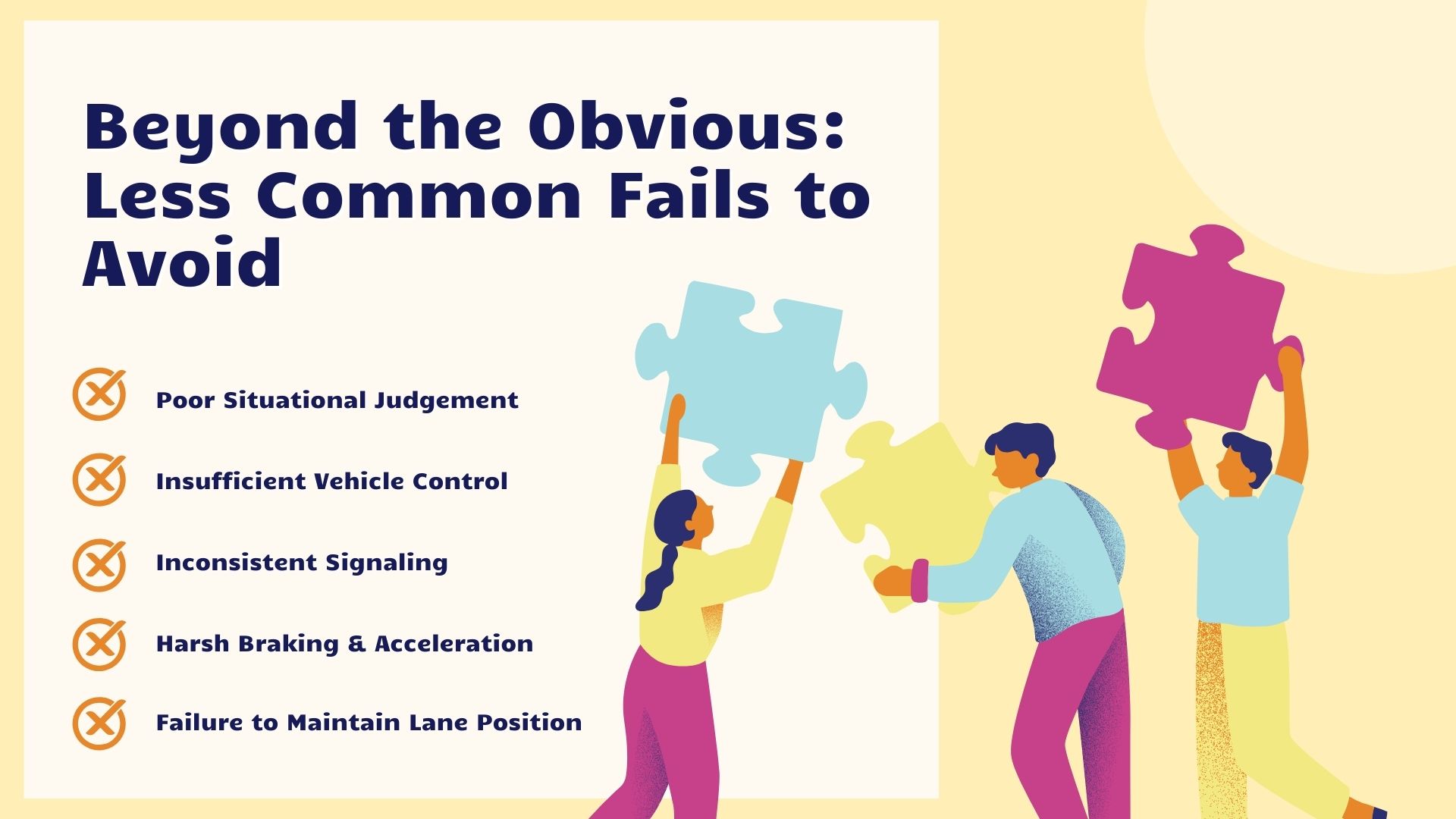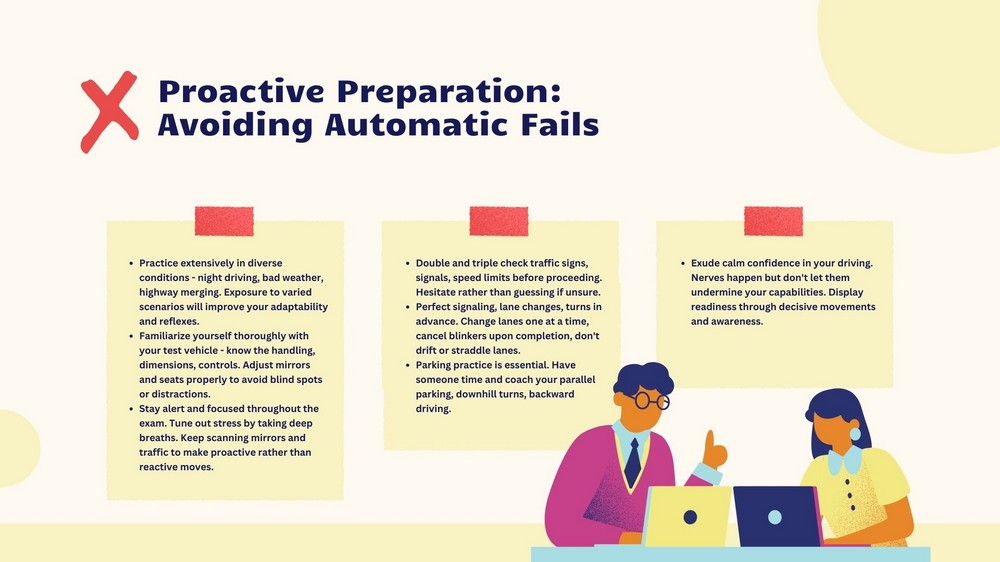Don't Let These Automatic Fails CRASH Your New York Driving Test!

Table of Contents
Taking the behind-the-wheel driving test in New York can be a nerve-wracking experience. While minor mistakes may only cost you a few points, certain dangerous errors will lead to automatic failure and force you to retake the test. Avoid letting your licensing dreams spin off course by understanding the most common automatic fails on New York driving exams.
Book your test at the Red Hook Driving Examination Site and prepare to pass with confidence!
This article will highlight the obvious and not-so-obvious test infractions that trigger immediate disqualification. We will also address common concerns about point deductions versus automatic fails to help you pass your NY driving test on the first try. Read on to get comprehensive tips and insider knowledge for a smooth road to certification!
From reckless driving to ignoring traffic signals, we've compiled key mistakes that examiners strictly enforce as instant fails. By being aware of these driver's test landmines, you can fine-tune your skills and exhibit safe driving habits under pressure. We'll also bust myths around tricky topics like parallel parking requirements.
With diligent preparation using these driving test tips, you'll have the awareness and confidence needed to avoid automatic failure. We've helped over 10,000 New Yorkers achieve licensing success - let us steer you towards the open road ahead!
Call Us Today 6AM-10PM
Or fill out the form 24/7
Our team is here to guide you with promotions, instructor availability, and the best training package for you.
What are Automatic Fails in NY?

Before diving into the specifics, let's define what automatic fails mean on your New York driving exam. Unlike minor mistakes which deduct points from your overall score, automatic fails result in immediate road test disqualification. It doesn't matter if you were one turn away from finishing or had a near perfect score up until that point. Some dangerous errors are deemed so egregious that you cannot pass once they are committed.
While every state has its own standards, some of the most universal automatic fails across the US include:
- Failing to yield right of way to other vehicles, cyclists or pedestrians
- Disobeying traffic signs and signals like stop signs, red lights, or regulatory speed limits
- Exceeding the speed limit significantly or driving at inconsistent speeds
- Reckless or aggressive actions such as swerving, tailgating, drifting lanes
- Losing control and hitting objects, mounting curbs, or causing an accident
- Driving under the influence of alcohol or drugs, including prescribed medicines
The rationale behind these instant fails relates directly to safe driving habits and accident prevention. As a new driver, you lack extensive experience gauging speed or distances. You also haven't built key reflexes or instincts needed to respond to unpredictable scenarios on the road. Any dangerous, negligent or impaired driving compromises public safety and warrants immediate test termination by the examiner.
While some automatic failures like DUI seem obvious, others involving poor judgment are easily overlooked by test takers. Continue reading to discover additional fails relating to improper operation, lack of vehicle control, inconsistent signaling, and more.
Call Us Today 6AM-10PM
Or fill out the form 24/7
Our team is here to guide you with promotions, instructor availability, and the best training package for you.
Beyond the Obvious: Less Common Fails to Avoid

While running red lights or reckless driving are clear auto-fails, some less obvious mistakes also lead to instant New York road test disqualification. Here are crucial errors often overlooked by exam candidates:
Poor Situational Judgement
- Misinterpreting hazards or distance incorrectly
- Hesitating too long when assessing scenarios
- Failure to demonstrate appropriate urgency or caution
While subjective, examiners expect you to read traffic conditions and react reasonably. Poor judgment in making left turns, merging, or stopping can betray your lack of driving maturity even if no accident occurs.
Insufficient Vehicle Control
- Not checking blind spots thoroughly before lane changes
- Confusion operating essential features like windshield wipers or lights
- Lack of steering control when turning or parking
Your ability to understand your vehicle's dimensions, handling, and equipment is mandatory. For instance, not knowing how to operate rear window defrosters or miscalculating the turning radius can lead to auto-failure.
Inconsistent Signaling
- Failing to use turn signals properly for lane changes
- Not cancelling blinkers upon completing turns or merges
- Using ambiguous hand signals incorrectly
Incorrect signaling might seem trivial but communicates unpredictability to other motorists. Examiners expect you to signal intent clearly, timely and cancel blinkers once the maneuver finishes.
Harsh Braking & Acceleration
- Braking too hard - passengers lurching forward
- Accelerating rapidly or erratically
Unsafe speed control demonstrates poor vehicle handling skills. Expect to fail if examiners observe harsh braking outside emergencies or uneven acceleration causing unstable driving.
Failure to Maintain Lane Position
- Weaving in and out of marking lines
- Straddling two lanes for extended periods
- Drifting into other lanes or driving shoulders
Maintaining your lane position is essential for safe navigation. Be wary of edge lining, wide turns, wandering over markings, or an inability to keep the vehicle straight within a single lane.
While not as clear-cut as running a red light, these subtle mistakes communicate the lack of experience required for passing your road test. Continue reading to learn how evaluators distinguish between auto-fails versus point deductions on your New York license exam.
Gray Areas: Can You Still Pass with Minor Infractions?
You now understand the major mistakes that trigger automatic failure on your New York driving test. But what about more minor infractions? Can you still pass if you lose points in specific areas? Let's break it down.
Can I fail the parallel parking portion and still pass my NY driving test?
Yes, it is possible to fail your parallel parking maneuver but score high enough to pass overall. Unlike obvious safety threats, struggling with parallel parking alone typically results in point deductions, not immediate disqualification. As long as the rest of your test goes smoothly, minor parking errors may not prevent you from getting your license.
How many points can you lose before automatic failure on the road test?
The New York DMV sets the pass/fail cutoff score at 20 points deducted.
- If you lose 20 or fewer points, you pass
- 21+ points lost results in automatic failure
Some dangerous mistakes subtract 5-8 points, while others warrant instant disqualification despite high scores elsewhere. Examiners focus primarily on safe driving habits - a few sloppy turns or stalls may be permissible, but uncontrolled swerving or ignorance of traffic signals will fail you immediately.
What if I exceed speed limits briefly but otherwise drive safely?
Exceeding posted speed limits risks automatic failure, especially in school zones or neighborhoods. However, briefly accelerating on a highway on-ramp or quiet street may only count as 1-3 points rather than instant disqualification.
The key is demonstrating awareness of speed regulations and safe control relative to conditions. Certain situations offer more flexibility than others when evaluating speed.
The scoring system accounts for typical beginner mistakes so that minor slip-ups won't necessarily prevent you from getting your license. However, any sustained pattern of ignorance or risky behavior communicates failed readiness for independent driving privileges.
Proactive Preparation: Avoiding Automatic Fails

Now that you know the major automatic fail points, let's discuss proactive tactics to avoid them during your New York road test:
- Practice extensively in diverse conditions - night driving, bad weather, highway merging. Exposure to varied scenarios will improve your adaptability and reflexes.
- Familiarize yourself thoroughly with your test vehicle - know the handling, dimensions, controls. Adjust mirrors and seats properly to avoid blind spots or distractions.
- Stay alert and focused throughout the exam. Tune out stress by taking deep breaths. Keep scanning mirrors and traffic to make proactive rather than reactive moves.
- Double and triple check traffic signs, signals, speed limits before proceeding. Hesitate rather than guessing if unsure.
- Perfect signaling, lane changes, turns in advance. Change lanes one at a time, cancel blinkers upon completion, don't drift or straddle lanes.
- Parking practice is essential. Have someone time and coach your parallel parking, downhill turns, backward driving.
- Exude calm confidence in your driving. Nerves happen but don't let them undermine your capabilities. Display readiness through decisive movements and awareness.
As a beginner, you will make errors so don't expect flawless performance. But refusing to endanger others displays the maturity examiners seek.
Still need more targeted coaching? Schedule driving lessons with our certified instructors! Our individualized training will help instill safe habits while getting road test ready.
Stay tuned for a full recap of strategies for passing your NY license exam!
Steer Clear of Instant Failure by Avoiding These New York Driving Test Mistakes
Taking the behind-the-wheel driving exam for your New York license is undoubtedly a nerve-wracking feat. While perfect execution is unrealistic for beginners, certain dangerous errors warrant instant failure regardless of your score up to that point. Automatic fails result from behaviors deemed too risky for awarding driving privileges, though not every mistake leads to disqualification.
We summarized the most prevalent automatic fails relating to reckless operations like ignoring traffic signals, speeding, drunk driving, and losing vehicle control. Additionally, we covered less obvious yet critical mistakes involving poor situational judgment, inconsistent signaling, lane wandering, and shaky vehicle handling. While minor infractions only deduct points, ongoing ignorance of safety standards fails a driving test immediately.
Keep this knowledge front of mind when preparing for your exam! Confident readiness comes from extensive practice in diverse conditions, parking skill mastery, and heightened alertness when navigating intersections, speed transitions, and highway merges. Though nerves are inevitable, exhibit your capabilities by driving decisively while putting safety first. Limit test anxiety by proactively drilling your weaknesses using a professional driving instructor.
We hope these insights help you avoid the top mistakes triggering instant failure on New York driving exams.

Call Us Today 6AM-10PM
Or fill out the form 24/7
Our team is here to guide you with promotions, instructor availability, and the best training package for you.
Frequently Asked Questions
-
What happens if I fail the road test? Can I retake it?
If you fail your initial road test, you typically must wait 7-14 days before being allowed to retest, depending on your state's regulations. You can take the driving test again by repaying the licensing fee and scheduling a new exam time. Most states allow unlimited retests, as long as you pay each time.
-
If I fail my driving test 3 times, do I have to take classes?
In many states like California and Florida, failing your road test 3 times requires you enroll in behind-the-wheel driver education before trying again. These supplemental classes help drivers practice where they struggle most through customized lesson plans. Lessons continue until instructors feel you are ready to pass.
-
Can I fail the driving test for speeding?
Yes, exceeding the speed limit by more than 10 mph typically results in automatic failure, especially in neighborhoods and school zones. However, briefly accelerating on highways or empty roads may only deduct points unless excessively over limits. The key is maintaining control and safe speeds for conditions.
-
If I fail parallel parking, will I fail the whole test?
Not necessarily. Struggling with parallel parking often only deducts points rather than causing instant failure if you ace the remainder of your test. As long as your cumulative point deductions stay under your state’s cutoff, minor parking errors may not prevent passing overall.
-
What documents do I need to take the road test?
To take your initial driving test, most states require your learner's permit, proof of insurance, vehicle registration, and a licensed accompanied driver older than 21. Arrive early with all necessary paperwork to avoid delays. Check your state DMV website for additional documentation or COVID requirements.
 English
English Spanish
Spanish 

